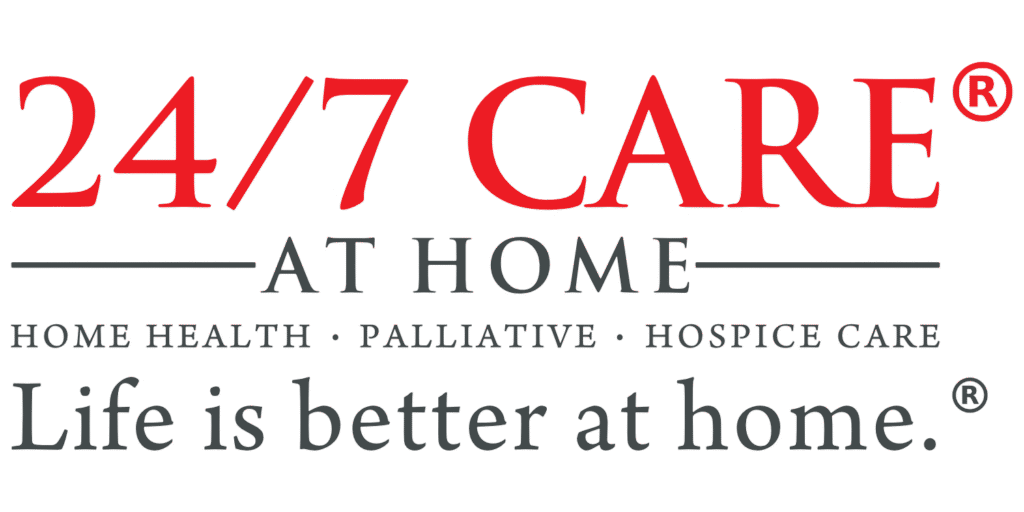How Diet Works to Manage High Blood Pressure in Older Adults
If you’re caring for an aging parent or loved one, managing their health at home can feel like a full-time job, especially when high blood pressure enters the picture. Many families focus on medication, but often overlook the powerful role that lifestyle choices, like diet and stress levels, play in managing blood pressure at home.
At 24/7 Care at Home, we believe that simple, daily habits can make a lasting difference in a senior’s heart health. Two of the most important and underestimated factors? Salt and stress.
Why Lifestyle Matters in High Blood Pressure Management
High blood pressure in seniors affects over 60% of adults aged 65 and older. And while medications are often necessary, lifestyle adjustments can significantly lower blood pressure and improve overall well-being.
Two key lifestyle culprits in rising blood pressure are:
- Too much sodium in the diet
- Chronic emotional or physical stress
The Role of Salt in Blood Pressure
How Salt Affects Seniors
When we consume too much sodium, the body retains more water to dilute it. This added fluid increases pressure in the blood vessels, raising blood pressure. Seniors are especially vulnerable to this because kidney function naturally declines with age, making it harder to remove excess sodium from the body.
Reducing salt intake is one of the quickest and most effective ways to lower blood pressure, especially in the elderly.
Common High-Sodium Foods to Watch Out For:
- Canned soups and stews
- Processed meats like ham, bacon, or sausage
- Frozen dinners and packaged snacks
- Fast food and takeout meals
- Sauces, dressings, and condiments (like soy sauce or ketchup
Tip: Look for “low sodium” or “no added salt” labels, and aim for less than 1,500 mg of sodium per day.
How Stress Raises Blood Pressure
Stress doesn’t just affect the mind, it impacts the body too. When we’re under stress, the body releases hormones like cortisol and adrenaline, which tighten blood vessels and make the heart beat faster. This can temporarily spike blood pressure, and over time, chronic stress can lead to long-term hypertension.
Common Sources of Stress in Seniors:
- Grief, loneliness, or social isolation
- Loss of independence or mobility
- Financial concerns
- Cognitive decline or confusion
- Physical discomfort or pain
Simple Stress-Reducing Habits for Seniors
Helping your loved one manage stress at home can improve not just blood pressure, but overall mood and quality of life.
Calm and Comfort Tips:
- Encourage a consistent daily routine
- Use music or soft lighting to create a peaceful space
- Support spiritual practices like prayer or meditation
- Incorporate light exercise or outdoor time
- Limit overstimulating activities (like loud TV)
Stress management should be a core part of any plan to control hypertension in the elderly.
How Home Care Can Help Manage Salt and Stress
You don’t have to manage this alone. Professional home health care can support your loved one by:
- Monitoring daily blood pressure levels
- Preparing low-sodium, heart-healthy meals
- Providing companionship to ease stress and loneliness
- Helping with mobility or medication adherence
- Offering education and peace of mind to caregivers
Whether your family needs short-term support or is considering hospice care for complex needs, we’re here to help.
Let Us Support You at Home
At 24/7 Care at Home, we provide compassionate, personalized care that focuses on the whole person. From helping manage salt intake to reducing emotional stress, our team is committed to your loved one’s comfort, dignity, and heart health. Contact us today.
Vietnamese
Muối và căng thẳng: Lối sống ảnh hưởng đến huyết áp của bạn như thế nào
Nếu bạn đang chăm sóc cha mẹ lớn tuổi hoặc người thân, quản lý sức khỏe tại nhà có thể giống như một công việc toàn thời gian—đặc biệt khi tăng huyết áp xuất hiện. Nhiều gia đình tập trung vào thuốc men nhưng lại bỏ qua vai trò mạnh mẽ của các yếu tố lối sống như chế độ ăn và mức độ căng thẳng trong việc quản lý huyết áp tại nhà.
Tại 24/7 Care at Home, chúng tôi tin rằng những thói quen đơn giản mỗi ngày có thể tạo ra khác biệt bền vững cho sức khỏe tim mạch của người cao tuổi. Hai yếu tố quan trọng nhưng thường bị đánh giá thấp? Muối và căng thẳng.
Vì sao lối sống quan trọng trong quản lý tăng huyết áp
Tăng huyết áp ở người cao tuổi ảnh hưởng đến hơn 60% người từ 65 tuổi trở lên. Dù thuốc men thường cần thiết, những điều chỉnh lối sống có thể giúp hạ huyết áp đáng kể và cải thiện sức khỏe tổng thể.
Hai “thủ phạm” lối sống làm tăng huyết áp gồm:
- Quá nhiều natri (muối) trong khẩu phần
- Căng thẳng cảm xúc hoặc thể chất kéo dài
Vai trò của muối đối với huyết áp
Muối ảnh hưởng đến người cao tuổi như thế nào
Khi chúng ta tiêu thụ quá nhiều natri, cơ thể giữ nước để pha loãng natri. Lượng dịch tăng thêm này làm tăng áp lực trong mạch máu, khiến huyết áp tăng. Người cao tuổi đặc biệt dễ bị ảnh hưởng vì chức năng thận suy giảm theo tuổi, khiến việc thải bớt natri trở nên khó khăn hơn.
Giảm lượng muối ăn vào là một trong những cách nhanh chóng và hiệu quả nhất để hạ huyết áp, đặc biệt ở người lớn tuổi.
Những thực phẩm nhiều natri cần lưu ý:
- Súp và món hầm đóng hộp
- Thịt chế biến như giăm bông, ba rọi xông khói hoặc xúc xích
- Bữa ăn đông lạnh và đồ ăn đóng gói
- Đồ ăn nhanh và món mua mang đi
- Nước sốt, xốt trộn và gia vị (như xì dầu hoặc tương cà)
Mẹo: Hãy tìm nhãn “ít natri” hoặc “không thêm muối”, và đặt mục tiêu dưới 1.500 mg natri mỗi ngày.
Căng thẳng làm tăng huyết áp như thế nào
Căng thẳng không chỉ tác động lên tâm trí mà còn ảnh hưởng đến cơ thể. Khi căng thẳng, cơ thể tiết ra các hormone như cortisol và adrenaline, làm co mạch và khiến tim đập nhanh hơn. Điều này có thể làm huyết áp tăng tạm thời; theo thời gian, căng thẳng mạn tính có thể dẫn đến tăng huyết áp lâu dài.
Nguồn gây căng thẳng thường gặp ở người cao tuổi:
- Mất mát, cô đơn hoặc cô lập xã hội
- Mất đi sự độc lập hoặc khả năng vận động
- Lo lắng tài chính
- Sa sút nhận thức hoặc lú lẫn
- Khó chịu thể chất hoặc đau đớn
Thói quen đơn giản giúp giảm căng thẳng cho người cao tuổi
Gợi ý tạo sự bình yên và thoải mái:
- Khuyến khích lịch sinh hoạt đều đặn mỗi ngày
- Dùng âm nhạc nhẹ nhàng hoặc ánh sáng dịu để tạo không gian yên tĩnh
- Hỗ trợ thực hành tâm linh như cầu nguyện hoặc thiền
- Kết hợp vận động nhẹ hoặc thời gian ở ngoài trời
- Hạn chế hoạt động gây kích thích quá mức (như TV quá ồn)
Quản lý căng thẳng nên là một phần cốt lõi trong kế hoạch kiểm soát tăng huyết áp ở người lớn tuổi.
Chăm sóc tại nhà có thể giúp quản lý muối và căng thẳng như thế nào
Bạn không cần phải làm điều này một mình. Dịch vụ chăm sóc sức khỏe tại nhà có thể hỗ trợ người thân của bạn bằng cách:
- Theo dõi huyết áp hằng ngày
- Chuẩn bị bữa ăn ít muối, tốt cho tim mạch
- Cung cấp bạn đồng hành để giảm căng thẳng và cô đơn
- Hỗ trợ di chuyển hoặc tuân thủ dùng thuốc
- Cung cấp giáo dục và sự yên tâm cho người chăm sóc
Dù gia đình bạn cần hỗ trợ ngắn hạn hay đang cân nhắc hospice cho các nhu cầu phức tạp, chúng tôi luôn sẵn sàng giúp đỡ.
Hãy để chúng tôi đồng hành cùng bạn tại nhà
Tại 24/7 Care at Home, chúng tôi cung cấp dịch vụ chăm sóc cá nhân hóa, đầy lòng trắc ẩn, tập trung vào toàn diện con người. Từ việc giúp kiểm soát lượng muối đến giảm căng thẳng cảm xúc, đội ngũ của chúng tôi cam kết vì sự thoải mái, phẩm giá và sức khỏe tim mạch của người thân bạn. Liên hệ với chúng tôi ngay hôm nay.
Frequently Asked Questions
What is palliative care in Los Angeles County?
Palliative care is specialized support to manage symptoms and improve quality of life for those with serious illnesses. 24/7 Care at Home provides in-home palliative care in Los Angeles County, serving areas like Long Beach and Torrance.
Who can benefit from in-home palliative care?
Anyone with a serious illness, such as cancer, COPD, or heart disease, can benefit from palliative care, regardless of their prognosis. 24/7 Care at Home tailors care for patients in Pasadena, Santa Monica, and beyond.
Is palliative care covered by insurance?
Many palliative care services are covered by Medicare, Medicaid, or private insurance. 24/7 Care at Home helps Los Angeles County families navigate coverage to ensure affordable care. Contact us to learn more.






